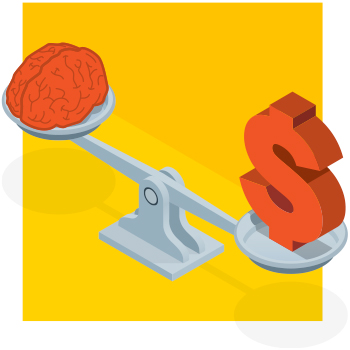
When it comes to brain injury settlements, no two cases are exactly alike. Some victims may recover fully, while those who suffered a traumatic brain injury may be left with a lifetime of physical and mental impairments as well as emotional and behavioral changes. And that’s not to mention their huge medical expenses.
As a result, calculating the damages for a brain injury settlement can be complicated. Still, if you or a loved one has experienced a brain injury and is considering legal action, you deserve to know what you might stand to recover. Here’s what you need to know about how a brain injury settlement is calculated.
Types of Damages in a Traumatic Brain Injury Settlement
When brain injury attorneys use the term “damages,” they’re referring to the collective losses, expenses, hardships, and suffering a victim has experienced as a result of the brain injury. Generally speaking, there are two types of damages that are eligible for compensation under personal injury law, and they both factor in the negotiations for a traumatic brain injury settlement: economic damages and non-economic damages.
Economic Damages
Often referred to as “monetary damages” or “special damages” in legalese, these types of damages have a clear and provable monetary value. Some examples include:
- Hospital bills
- Lost wages
- Loss of future income
- Additional medical expenses (MRIs, CT scans, prescription drugs, doctor’s bills, etc.)
- Out-of-pocket costs
- Property damage
- Funeral and burial expenses (in the event of a wrongful death)
Non-Economic Damages
Often referred to as “general damages” or “psychological damages,” non-economic damages are losses that don’t have a clear and provable monetary value. This makes it more difficult to show evidence for non-economic damages, since they are not reflected in medical bills or other proven forms of expense.
With the help of a brain injury accident lawyer, victims of a traumatic brain injury can still recover compensation for these damages. However, the money will be only a rough estimate of the magnitude of the damage. Examples of non-economic damages in a traumatic brain injury case can include:
- Pain and suffering
- Emotional distress
- Mental trauma
- Post-traumatic stress disorder (PTSD)
- Loss of enjoyment of life / diminished quality of life
- Disability or disfigurement
- Depression, stress, anxiety and fear
- Loss of love, affection, support or companionship
Any settlement for a traumatic brain injury should fairly reflect the totality of the victim’s economic and non-economic damages. Various formulas are available to assist in the calculation of non-economic damages, which must have a reasonable relation to the total value of the economic damages.
Factors to Consider in a Traumatic Brain Injury Settlement
A brain injury is one of the most severe injuries a person can suffer. Although some victims recover and return to their normal life, others are left with life-changing consequences. As a result, the settlements for traumatic brain injuries vary drastically depending on the case. Here are some of the different factors that affect settlement figures in a traumatic brain injury case:
- Hospital care. As mentioned above, some brain injuries result in lengthy periods of hospitalization, requiring doctor visits, blood work, X-rays, surgeries, and more. Considering that the average cost of a day in the hospital can reach $4,500 depending on where you live, lengthy hospitalization for a traumatic brain injury can be financially crippling. If your injury resulted in an extended hospital stay, your settlement will most likely increase to cover both the economic and non-economic portions.
- Medical treatment. If you or a loved one has experienced a traumatic brain injury, you know that the cost of medical care can be debilitating. The expenses of surgery, extended stays, visits with specialists, and rehabilitation or at-home care add up quickly. As a result, medical treatment generally accounts for the largest portion of a brain injury victim’s economic damages.
How Much Compensation Do You Get for a Brain Injury?
With a strong record of recovering millions on behalf of brain injury victims, we know the physical, emotional, and financial effects this type of injury can have on a victim and his or her family. Some of our most successful cases have helped ensure our clients have the resources they need to future care and other expenses. These include:
- $33.5 million verdict for a delayed C-section that caused severe brain damage
- $24 million verdict for a child who suffered a brain injury after doctors failed to recognize an airway obstruction
- $5.5 million recovery for a man who suffered brain damage after an anesthesia mistake
A Brain Injury Law Firm That Fights Tirelessly for Your Right to Compensation
If you or a loved one has suffered as the victim of a brain injury, you have a right to compensation for your suffering. The brain injury lawyers at Janet, Janet & Suggs have 40 years of experience representing brain injury victims throughout the country and can help you seek the compensation you need. Contact us today for a free, no-obligation consultation. We do not get paid unless you do. We’ll advocate for your legal rights so that you can focus on your recovery.
